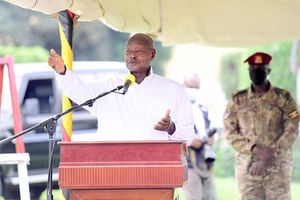
Author: Asuman Bisiika. PHOTO/FILE
There was a time when popular engagement with the government was captured in the line: Twagala Gavumenti Etuyambe (we need government intervention). It was such a rage that some people even threw it where it was not necessary. With no government intervention, Ugandans coined another line in what looked like an expression of helplessness: it was Tuli Kuki (what is our vision)?
Twagala Gavumenti Etuyambe (TGE) was about a population that expected government to solve their problems, Tuli Kuki (TK) was about a population expressing some kind of hopelessness framed in the failure or lack of understanding government actions.
TGE had a first person plural (the people) speaking to a second person singular (the media) via whom the people were addressing a third person singular (government).
The subject of TGE was always a local challenge affecting the people in a more direct way. TK also had first person plural (the people) addressing or challenging themselves. It was people addressing themselves over an issue: tuli kuki (what are we doing?). All speech must have an addresser and addressee; even in a soliloquy (a literary tool) capturing the human sense of thinking aloud. It was clear the voice in tuli kuki was addressing the affected person (not a third party: the government). Neither was there a second party (the media?): this is a voice in the “we” challenging “us”. It is more like the people challenging themselves.
So, whereas TGE was a call to get a local problem solved by government, it carried the feeling that there was a government that could really solve it. TK, on the other hand, was an expression of a feeling that government actions almost make it non-existent in the psyche of the population. Now, a political activist like Dr Kizza Besigye could stretch the TK to mean “the population is merely rallying itself to take charge of things…”
And now we ask: how are the people subtly engaging the government?
**************
Milton Obote and Yoweri Museveni are two dominant figures in Uganda’s first 60 years of independence. Obote seemed to be politically driven by what he believed was the process of building a Uganda that was good for Ugandans. Museveni seems to be driven by the idea that his leadership alone can deliver Ugandans to a Uganda they want. Someone writing Uganda’s political history could capture things like “both Obote and Museveni could do and promise anything at the conference table so long as their offers were subordinated to the retention of their core position: which was merely the retention of power.
They were civil, ideological and rhetorically articulate at the conference table; even claiming or posturing to be representing the higher values of the state or the people. But they responded with singularity of purpose if they were challenged outside the conference room.
When Obote was openly challenged in the 1960s, he did not seek recourse to his eloquence and articulate rhetoric. He deployed military resources at his disposal to settle an otherwise political disagreement. With that action alone, Obote introduced the gun in the politics of Uganda. From then on, military resources have become the core political constituency in the body politic of Uganda. The gun, which was introduced into politics by Obote, was later to be refined by Museveni to perfection”.
And then Museveni introduced another item in the national politics: money. In fact after the removal of presidential term limits in 2005, almost all political debates in Uganda have revolved around (or have been resolved by) money.
There is money in corruption, buyouts of political opponents, inundation of electoral process with money etc. And then there is money in Parliament.
Asuman Bisiika is the executive editor of the East African Flagpost. [email protected]




